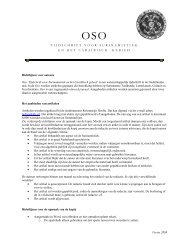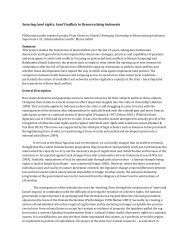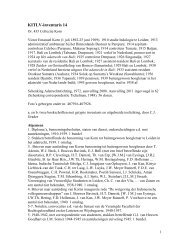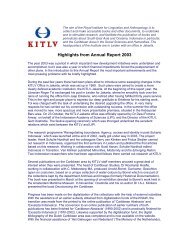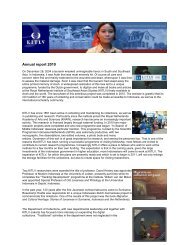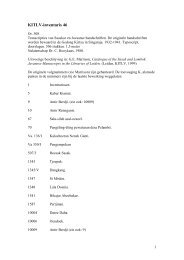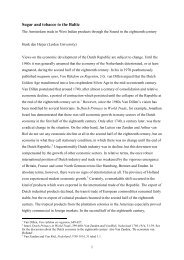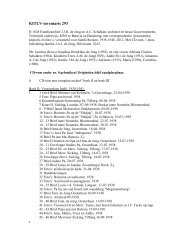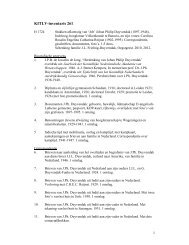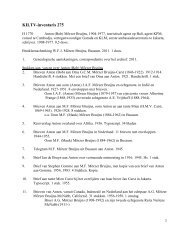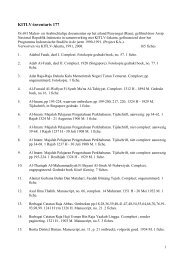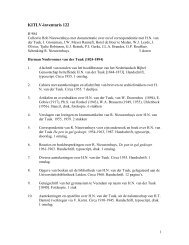indonesian economic decolonization in regional and ... - kitlv
indonesian economic decolonization in regional and ... - kitlv
indonesian economic decolonization in regional and ... - kitlv
You also want an ePaper? Increase the reach of your titles
YUMPU automatically turns print PDFs into web optimized ePapers that Google loves.
Indonesian <strong>economic</strong> <strong>decolonization</strong> <strong>in</strong> <strong>regional</strong> <strong>and</strong> <strong>in</strong>ternational perspective 13<br />
adm<strong>in</strong>istrative apparatus was not renowned for efficiency <strong>and</strong> cooperation<br />
with private capital from the former coloniz<strong>in</strong>g power was brutally cut off.<br />
Such a record easily lends support to the idea that Indonesia’s long-term<br />
<strong>economic</strong> performance was adversely affected by the way <strong>in</strong> which <strong>economic</strong><br />
<strong>decolonization</strong> was accomplished.<br />
For a fuller underst<strong>and</strong><strong>in</strong>g of the process <strong>and</strong> its outcome, we also need to<br />
take <strong>in</strong>to consideration some of the complexities highlighted <strong>in</strong> this volume.<br />
The colonial legacy shouldered an extraord<strong>in</strong>ary burden on the new nationstate<br />
at a time of rapidly ris<strong>in</strong>g expectations. Nevertheless, domestic bus<strong>in</strong>ess<br />
thrived to an appreciable extent <strong>and</strong> Indonesia benefitted, at any rate <strong>in</strong>itially,<br />
from the boom <strong>in</strong> world trade with its favourable market prospects for chief<br />
export commodities leav<strong>in</strong>g Indonesia. Economic pragmatism of the early<br />
<strong>and</strong> mid-1950s appeared to strike an acceptable balance between nationalist<br />
aspirations <strong>and</strong> the <strong>in</strong>sistence on what is commonly understood as sound<br />
management of <strong>economic</strong> resources. This balance was lost <strong>in</strong> the late 1950s,<br />
when highest priority was given to the political aspirations of ga<strong>in</strong><strong>in</strong>g full<br />
control over the economy at virtually any cost. Even so, the accelerated transfer<br />
of management may not necessarily have had an adverse effect on <strong>economic</strong><br />
performance <strong>in</strong> the long run. The overall impression of the Sukarno era<br />
(1945-1966), <strong>in</strong>clud<strong>in</strong>g <strong>economic</strong> <strong>decolonization</strong>, rema<strong>in</strong>s unduly coloured by<br />
the near-collapse of the economy <strong>and</strong> the regime’s cataclysmic conclusion <strong>in</strong><br />
the mid-1960s.<br />
Historians are fond of speculat<strong>in</strong>g about the counterfactual, an exercise<br />
that may be aided by look<strong>in</strong>g at comparable situations elsewhere. Could <strong>economic</strong><br />
<strong>decolonization</strong> have taken the same peaceful course as <strong>in</strong> for <strong>in</strong>stance<br />
Malaysia, India or the Philipp<strong>in</strong>es? The answer is probably no, consider<strong>in</strong>g<br />
the colonial legacy, the struggle for acknowledgement of political <strong>in</strong>dependence<br />
<strong>and</strong> the <strong>in</strong>creas<strong>in</strong>g polarization <strong>in</strong> politics <strong>in</strong> Indonesia itself dur<strong>in</strong>g the<br />
1950s. Could the Dutch government <strong>and</strong> rema<strong>in</strong><strong>in</strong>g private Dutch enterprises<br />
have done more to smooth the process? It is by no means certa<strong>in</strong> that other<br />
policies would have made much of a difference. However, the unresolved<br />
conflict about western New Gu<strong>in</strong>ea did develop <strong>in</strong>to a formidable obstacle<br />
to compromises by either side <strong>and</strong> may arguably have prematurely caused<br />
such radical measures as nationalization. At the same time, the Dutch enterprises<br />
lost much goodwill because of the meagre achievements <strong>in</strong> terms of<br />
Indonesianisasi, thus becom<strong>in</strong>g easy scapegoats for everyth<strong>in</strong>g that was go<strong>in</strong>g<br />
wrong <strong>in</strong> the explosive situation of acute crisis that prevailed <strong>in</strong> Indonesia <strong>in</strong><br />
the late 1950s (Bondan Kanumoyoso 2001).




